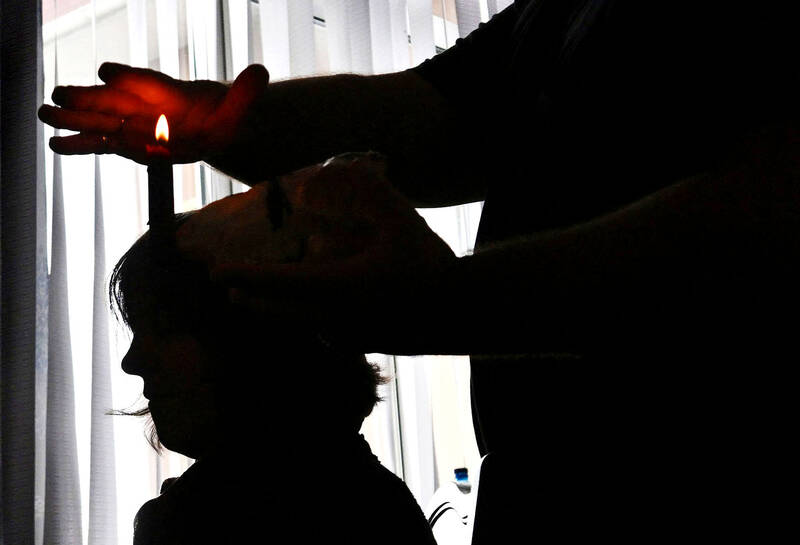For decades, possibly centuries, magicians have fretted and argued over if and when it is acceptable to reveal the secrets of their tricks and illusions.
Now two British academics — who are magicians themselves — have written what is believed to be the first detailed study examining what is known in the trade as “exposure”.
Gustav Kuhn and Brian Rappert, academics from the universities of Plymouth and Exeter, asked hundreds of magicians from around the world about attitudes to exposure.

Photo: AFP
They found that exposing another magician’s trick when they are still alive was a big no-no, with fewer than 3 percent feeling this was acceptable.
However, it was deemed much more justifiable to expose a trick invented by a magician who was dead or to explain how an illusion you had developed yourself was done.
It was seen as wrong to reveal a trick for self-promotion and, while many thought it reasonable to pass on the secrets of a trick to a fellow magician, it was much less acceptable to draw back the curtain to someone who just wanted to know how it was done for the sake of it.

Photo: AP
Rappert and Kuhn, both members of the Magic Circle, are readying themselves for flak when their paper is published on Monday.
“It’s a huge, really controversial topic within the magic community,” said Kuhn, of the school of psychology at the University of Plymouth and an exponent of closeup and street magic. “Magicians get emotional about it.”
As in most aspects of modern life, money appears to come into it. Kuhn said: “If you pay for a magic trick, it’s OK to expose the magic secrets. If you pay me for the secrets, then I’m allowed to expose it, but if I give you the secret for free, then that’s not OK.

Photo: AFP
“Magic could only advance through the sharing of certain secrets and magicians need to make a living so that financial transaction seems to play a really important part.”
Kuhn was at the center of a storm in 2019 when the global charitable foundation Wellcome Trust ran a free exhibition called Smoke and Mirrors in London that explicitly explained general principles in magic, such as misdirection and forcing.
Kuhn, whose research featured in the show, said some magicians saw the free access to such information as a violation of the rules and he was formally investigated by the Magic Circle’s exposure committee.
“It seems very unlikely that the exhibition would have created the same kind of controversy had visitors been charged an entry fee,” he wrote in a paper.
It also examines some of the history of exposure, highlighting how the first president of the Magic Circle, David Devant, was forced to resign after extracts from his book Secrets of My Magic appeared in a popular magazine.
The paper investigates twisty tricks where some exposure arguably enhances a show. For example, the magician Caleb Morgan performed the classic trick in which he stuffed a silk bandana into his clenched hand only to open his fist to show the bandana had transformed into an egg.
Morgan then revealed the egg was plastic with a hole in the back for the bandana to enter — before cracking the egg to demonstrate it was, in fact, a normal egg.
Rappert, whose work includes using magic to convey how disclosure and concealment figure in everyday life and international relations, said this sort of exposure seemed acceptable.
“Some said it was perfectly fine to unveil a closely guarded secret if it’s in the context of performing a trick that relies on a different method.”
Kuhn and Rappert argue the study is needed because the internet has made it much easier for tricks to be exposed and therefore changes the rules of the game.
Their paper ends with a comment from the Magic Circle, which was shown the research before publication. The organization sternly makes it clear it was founded in 1905 upon the tenet of protecting the secrets of magicians.
But it adds: “The ramifications and implications of exposure are a grey area which are little understood and understudied. We welcome and applaud any research of this nature that helps us all to gain a better insight and understanding.”
The paper, Towards a Theory of Exposure, is available in the Journal of Performance Magic.

The Democratic Progressive Party (DPP), Chinese Nationalist Party (KMT), and the country’s other political groups dare not offend religious groups, says Chen Lih-ming (陳立民), founder of the Taiwan Anti-Religion Alliance (台灣反宗教者聯盟). “It’s the same in other democracies, of course, but because political struggles in Taiwan are extraordinarily fierce, you’ll see candidates visiting several temples each day ahead of elections. That adds impetus to religion here,” says the retired college lecturer. In Japan’s most recent election, the Liberal Democratic Party lost many votes because of its ties to the Unification Church (“the Moonies”). Chen contrasts the progress made by anti-religion movements in

Taiwan doesn’t have a lot of railways, but its network has plenty of history. The government-owned entity that last year became the Taiwan Railway Corp (TRC) has been operating trains since 1891. During the 1895-1945 period of Japanese rule, the colonial government made huge investments in rail infrastructure. The northern port city of Keelung was connected to Kaohsiung in the south. New lines appeared in Pingtung, Yilan and the Hualien-Taitung region. Railway enthusiasts exploring Taiwan will find plenty to amuse themselves. Taipei will soon gain its second rail-themed museum. Elsewhere there’s a number of endearing branch lines and rolling-stock collections, some

This was not supposed to be an election year. The local media is billing it as the “2025 great recall era” (2025大罷免時代) or the “2025 great recall wave” (2025大罷免潮), with many now just shortening it to “great recall.” As of this writing the number of campaigns that have submitted the requisite one percent of eligible voters signatures in legislative districts is 51 — 35 targeting Chinese Nationalist Party (KMT) caucus lawmakers and 16 targeting Democratic Progressive Party (DPP) lawmakers. The pan-green side has more as they started earlier. Many recall campaigns are billing themselves as “Winter Bluebirds” after the “Bluebird Action”

Feb 24 to March 2 It’s said that the entire nation came to a standstill every time The Scholar Swordsman (雲州大儒俠) appeared on television. Children skipped school, farmers left the fields and workers went home to watch their hero Shih Yen-wen (史艷文) rid the world of evil in the 30-minute daily glove puppetry show. Even those who didn’t speak Hoklo (commonly known as Taiwanese) were hooked. Running from March 2, 1970 until the government banned it in 1974, the show made Shih a household name and breathed new life into the faltering traditional puppetry industry. It wasn’t the first